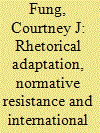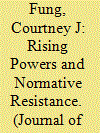| Srl | Item |
| 1 |
ID:
173741


|
|
|
|
|
| Summary/Abstract |
How do rising powers execute normative resistance to shape international order? Contrary to the existing literature, I argue that rising powers are productive agents of normative change and international order-making, through the use of rhetorical adaptation to contest pre-existing orders. Rhetorical adaptation is a strategy and set of tactics that simultaneously modifies norm content, while reducing critiques of obstructionism. To make this argument, this article traces China’s efforts as a ‘norm shaper’ regarding the responsibility to protect through the inception, institutionalization and implementation of the norm in the landmark 2011 Libya intervention. China layers traditional sovereignty norms under the responsibility to protect, focusing and narrowing the emerging norm by fortifying the primacy of the state. While I show how China resists co-option into an evolving ontological order that challenges traditional sovereignty, the article also addresses the unforeseen consequences of China’s normative efforts that ‘backfired’ to permit the use of the responsibility to protect to justify Libyan regime change. More broadly, this article speaks to rising powers as agents crafting international order, and the process of normative resistance that occurs throughout the norm life cycle. I draw from publicly available documents and semi-structured interviews with Chinese foreign policy and United Nations elites.
|
|
|
|
|
|
|
|
|
|
|
|
|
|
|
|
| 2 |
ID:
192098


|
|
|
|
|
| Summary/Abstract |
What explains rising powers’ approach to emerging norms that challenge ontological order? The article uses a controlled comparison of two rising powers, China and India, as they address the responsibility to protect, which reconceives state sovereignty as contingent. Both states rejected the norm at its inception, before diverging as UN Security Council members during norm application in the Libya intervention. China assumed a creative resister role, offering tactical concessions, while using traditional sovereignty norms to renovate norm content. India assumed a norm begrudger role, typified by rhetorical rejection and disengagement from evolving normative discourse, coupled with practical support for the responsibility to protect. These rising powers’ normative roles are shaped by their dual status and differing positions within the UN Security Council social environment.
|
|
|
|
|
|
|
|
|
|
|
|
|
|
|
|